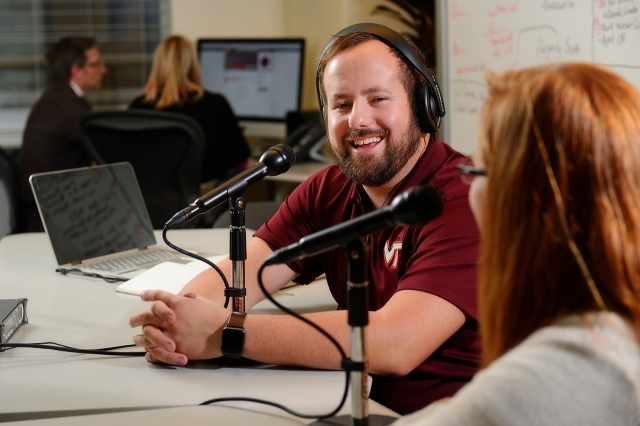
Whether attending as a cadet in the years following World War II, breaking ground as one of the first African-American women to be accepted as a student, or using time on the university tennis team to build a career as a professional tennis umpire, alumni made memories on campus.
Collectively, those stories and shared experiences tell Virginia Tech’s history.
Now, a team of faculty, staff, graduate students, and undergrads are working together to collect those stories and make them available through VT Stories.
The website launched on Nov. 12 with nearly 20 stories from a variety of alumni. Each story resides on its own page that includes a written narrative, images, and highly produced audio highlights from a longer oral history interview.
Individuals who are intrigued can dig deeper to find interview transcripts and recordings, housed in Special Collections.
“VT Stories is a place where people can find out about the multitude of stories that make up the history of Virginia Tech,” said Katrina Powell, who is the VT Stories coordinator, an English professor, and director of the Center for Rhetoric in Society. “On one hand it’s a great place to find out about great things going on at Virginia Tech and the really amazing things alumni do after leaving. It’s also a place to understand some of the complicated and meaningful — and not always happy — moments that happen at the university as a place for lots of change.”
Shelli Fowler, previously a Virginia Tech associate professor of English and senior director for Networked Pedagogies and Professional Development in Technology-enhanced Learning and Online Strategies (TLOS), came away from the LGBT project enthusiastic about the potential of the oral history technique to tell Hokie history.
Fowler, now an associate professor at Virginia Commonwealth University, shared her thoughts with Laura Sands, who had heard a wealth of stories from Virginia Tech alumni over the course of President Tim Sands’ first year at the university.
“After Tim was named president, we began hearing from Hokies around the world,” said Laura Sands. “In addition to offering a warm welcome, they told us their stories: about being a first-generation student, making groundbreaking discoveries, facing hardship, and achieving success. I remember feeling an urgent need to record and preserve these moments. The Virginia Tech community is a storehouse of experiential knowledge and wisdom that can greatly benefit our new Hokie graduates as they face a changing and challenging world.”
Some of the stories can be uncomfortable, especially those involving cadets who struggled in their first “rat” year or pioneers who broke racial and gender lines to attend Virginia Tech during tumultuous years of social change.
“Stories have power to amplify and confirm, but also to call into question our theories about history,” said Warnick. “That’s what we’re doing with some of these interviews. We’re finding stories that may have been marginalized and ignored, and we’re bringing those to the forefront. We want to include a range of stories and experiences, and we don’t want to varnish them. Many of these stories have awkward and painful moments in them. It’s important to acknowledge that.”
Stories told by the women of the Class of 1970 and by African-American women who attended in the late ’60s include reminders that the atmosphere on campus wasn’t always as welcoming as it is today.
At the same time, those same stories include humorous moments and a shared love of Virginia Tech that shines through even during challenging times.
The team of faculty, staff, and students wrote an article, titled “(co)Constructing public memories: interdisciplinary approaches to creating digital-born oral history archive,” that has been accepted in the academic journal Collections: A Journal for Museum and Archives Professionals to be published in a special 2017 issue called “Storytelling: Oral Histories, Archives, and Museums.”
The VT Stories team hopes to steadily add new stories, often collected during alumni reunion weekends through the fall. They’ll also be doing some short trips to collect interviews from alumni in western Virginia.
As the project grows and more stories appear online, the team intends to expand its efforts. In doing so, they’re producing an alternative Virginia Tech history that’s told not from an institutional perspective, but by the students who represent Tech’s footprint in the world.
To share your story, visit vtstories.org and click the “Share Your Story” tab in the upper right corner of the screen.

